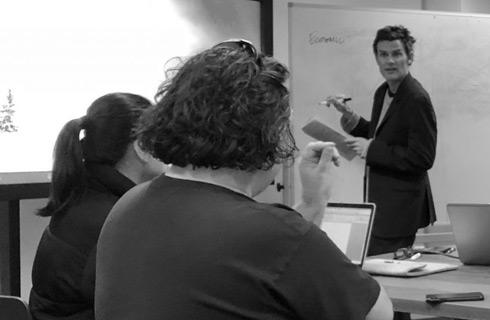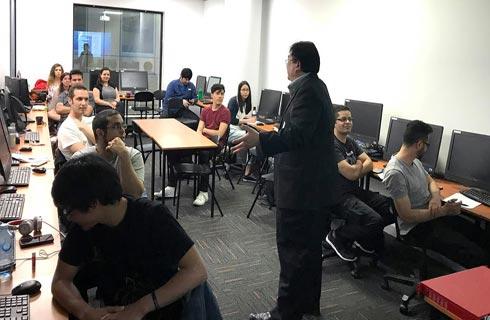- IDP China>
- 课程库>
- 医学与健康>
- 健康、医学和兽医研究>
- 公共卫生>
- Master of Public Health in Health Economics and Economic Evaluation
公共卫生硕士-卫生经济学和经济评估
Master of Public Health in Health Economics and Economic Evaluation

学历文凭
Masters Degree (Coursework)

专业院系

开学时间

课程时长

课程学费

国际学生入学条件
IDP—雅思考试联合主办方

雅思考试总分
- 雅思总分:
- 托福网考总分:
- 托福笔试总分:
- 其他语言考试:
CRICOS代码: 020358D
申请截止日期: 请与IDP联系 以获取详细信息。
课程简介
The program will appeal to those who want to move into the field of public health, as well as those who already work within a public health or health related field and are preparing for advancement in their organisation or field, or seeking to broaden their knowledge and skill set. Within the course students are exposed to the core foundations of public health theory and practice and also have the opportunity to specialise in the advanced public health training specialisations offered through the University of Melbourne. The Master of Public Health programs at the University of Melbourne are delivered by academic staff with extensive experience and depth of knowledge, who are leaders in their chosen fields of public health.Students taking subjects from this specialisation will be trained to apply economic theory and analytic tools to address public health problems. The specialisation equips students with essential knowledge and skills in microeconomics to allow them to analyse and discuss key policy issues in public health from an “economic” perspective. Within this specialisation students will learn how to interpret and apply economic evidence, they will also have the opportunity to develop the skills to conduct their own health economics research. They may focus on developing skills and knowledge necessary to evaluate whether new interventions or services offer value for money (through Economic Evaluation 1 and 2) andor to scrutinize public health policies and health care systems (through Health Economics 1 and 2). The skills and knowledge developed in this stream will help students understand and lead in areas of resource allocation including public health management and policy making. These skills can be applied in an Australian and international setting. Possible roles in the field of health economics include health analysist, health economist, health economics project officer, policy advisor, pharmacoeconomic or market access analyst, clinical audit, health economics research assistant, research fellow and PhD student. Future roles which either directly or indirectly involve health care resource allocation and budgeting will benefit from the analytical skills and expertise developed within both health economics and economic evaluation.
相关申请
 预科
预科 奖学金
奖学金 实习机会
实习机会 在校学习
在校学习 跨境学习
跨境学习 校园授课-线上开始
校园授课-线上开始 在线/远程学习
在线/远程学习
开学时间&学费
学费信息仅供参考,请与IDP联系以获取详细信息
| 开学时间 | 时长 | 学费 | 地点 |
|---|
学校排名

世界排名32
数据源:
泰晤士高等教育世界大学排名
关于墨尔本大学

墨尔本大学拥有独特的学习环境,拥有一系列专门为实现突破性发现而设计的可持续设施和校区。 该大学的研究和教育旨在解决当前现实世界的社会问题,重点关注关键的全球问题。该大学的研究网络支持澳大利亚和国际舞台上的尖端发现。 墨尔本历史悠久的帕克维尔校区位于三个全球公认的创新区的中心,该大学的八个专业校区提供生命科学和农业方面的沉浸式教育。 墨尔本的学生为未来在产业界和学术界的职业成功做好了充分的准备。墨尔本有太多值得体验的地方。 搬到这座城市的学生可以确信,他们将在澳大利亚的文化、美食和体育之都留下终生难忘的回忆。 墨尔本一直被经济学人智库评为世界上最宜居的城市之一。 人均咖啡馆、酒吧和餐馆的数量比世界上任何其他城市都多。 这意味着学生有很多地方可以与朋友见面、放松身心并吸收墨尔本独特的文化。墨尔本大学确保学生快速在这座城市安顿下来。 该大学为首次前往澳大利亚的学生提供量身定制的帮助。 大学设有专门的学生生活计划,以确保国际学生在当地文化和大学社区中感到宾至如归、与社区互动并茁壮成长。 该大学拥有世界上文化最多元化的学生群体之一,欢迎来自全球 160 多个国家/地区的国际学生。 墨尔本卓越的支持服务为学生在大学期间提供帮助,并为所有学生提供服务,即使他们毕业后也是如此。
本校相关课程
其他相关课程

理学学士(荣誉)人类生物学和传染病
 索尔福德大学
索尔福德大学泰晤士高等教育世界大学排名:981
学历文凭
Bachelor Degree with Honours
开学日期
课程费用总额


传染病与免疫生物学
 伦敦国王学院
伦敦国王学院学历文凭
Bachelor Degree with Honours
开学日期
课程费用总额


Master of Global Health/Master of Public Health (Extension) - Ageing and Health
 悉尼新南威尔士大学
悉尼新南威尔士大学学历文凭
Masters Degree (Coursework)
开学日期
课程费用总额


健康促进硕士
 阳光海岸大学
阳光海岸大学泰晤士高等教育世界大学排名:595
学历文凭
Masters Degree (Coursework)
开学日期
课程费用总额


公共卫生学士
 伍伦贡大学
伍伦贡大学泰晤士高等教育世界大学排名:247
学历文凭
Bachelor Degree
开学日期
课程费用总额


国际公共卫生硕士/公共卫生(扩展)硕士-公共安全
 悉尼新南威尔士大学
悉尼新南威尔士大学学历文凭
Masters Degree (Coursework)
开学日期
课程费用总额
















